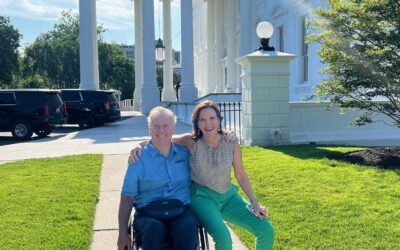 How often have you met a really smart person who did really dumb things? The reality is that our E.Q. (Emotional Intelligence) determines our success in our work, our relationships, and life far more profoundly than our ability to computer mathematical equations. And the good news is that unlike your I.Q. which is relatively fixed, your E.Q. is something you can build as you age. Which is why I find the concept of “Emotional Intelligence” so intriguing, and its application so compelling.
How often have you met a really smart person who did really dumb things? The reality is that our E.Q. (Emotional Intelligence) determines our success in our work, our relationships, and life far more profoundly than our ability to computer mathematical equations. And the good news is that unlike your I.Q. which is relatively fixed, your E.Q. is something you can build as you age. Which is why I find the concept of “Emotional Intelligence” so intriguing, and its application so compelling.
I’ve spent the last week travelling around the US speaking to some really smart people. Yet despite meeting plenty people with IQs likely far higher than my own (not that I’ve ever had it tested mind you), the issues that people have shared with me again and again – like how to deal with difficult colleagues, navigate office politics, influence without authority, manage conflict, build collaboration, say no to pushy people, find time to exercise, give critical feedback, engage unmotivated employees and be more highly valued as a leader – are not one’s that can be solved through a high IQ, but with a strong EQ.
We human beings are innately emotional creatures. As Daniel Goleman wrote in his groundbreaking book Emotional Intelligence, “Emotions guide everything we do.” Of course some people are naturally better at managing their emotions than others, but none of us have any choice about whether or not we emote. In fact, we emote before we even reason. What gets us in trouble, and can drive us to act in brainless way, is that, left unchecked, emotions can trump reason. And when they do we have what psychologists have coined a “Neural Hijack.” When something in our environment triggers the primitive part of our brain (called the Amygdala), it springs instantly into action, high jacking the thinking part of our brain (the Neo-Cortex). Unless we intervene to short circuit that reactive response, our amygdala bypasses logic, rationalism and reason. Neural highjack ensues. The result is rarely pretty.
I mean, why else would someone get out of their car on a busy freeway, risking their life in the process, to abuse a fellow driver for cutting in front of them? And why on earth would a smart, MBA educated executive send a highly offensive and emotionally charged email to a colleague, copying the entire team, for messing up on a report? Particularly when, if they stopped to think about it long enough, they’d know that it could severely damage their reputation, and derail their career. And, closer to home, why on earth would a mother of four kids scream at them like a crazy mad woman for not tidying their rooms when she knows a firm calm voice would get a better result? Not that THIS mother of four messy children would do that, of course.
Needless to say Emotional Intelligence has everything to do with being courageous. Because unless we are aware of how fear is driving us to play safe, stay quiet, and minimize the risk of disappointment, rejection or failure, those fears will run our lives. In the TV interview above, I shared how our Emotional Intelligence equals Interpersonal Effectiveness (EI = IE). Our ability to manage our emotions, and respond well to the myriad emotions that those around us are feeling, can have a profound impact on our ability to cope with change, to build trust in our relationships, advance our career and enjoy the wellbeing we want. But don’t just take it from me. Research from Harvard, Stanford and numerous other leading institutions has all concluded that one’s E.Q. is a stronger predictor of success – as a leader, employee, parent and spouse – than traditional measures of intelligence. In other words, EQ trumps IQ at every turn. Indeed there’s a very hard case for soft skills.
The good news is that we are never too old (or too young) to become more emotionally intelligent. In fact, we actually get better at it as we get older. It begins with cultivating greater self-awareness, the basic building block for success in all arenas of life. Tuning in to and acknowledging the emotions that you are feeling is the first step towards managing them. Being able to “Short Circuit” your amydgala’s primitive “fight, flight or freeze” response, and channeling the destructive impulses that some emotions give rise to (like anger, jealousy, disappointment, rejection and fear) in more constructive ways will make all the difference in how you deal with the challenges (and challenging people) that come your way each day.
Training in Emotional Intelligence is a core part of the leadership programs that I run. I’ve also been applying it in my own life. From both I have learned that building E.Q. is often two steps forward, one step back (those messy rooms often triggering the step back.) I’d like to think that I always catch myself heading into an emotional nose dive and short circuit that “Neural Highjack” before it takes over. But alas, sometimes I don’t. Such is being human. Sometimes fear, disappointment and upset make a home in my head for longer than serves me… or anyone else. But I’ve also learnt that when we are intentional about being more mindful of our emotions, we get better at shifting them before they trigger us to act in ways that hurt us and those around us. When I find myself starting to feel upset, disappointed, hurt or anxious, I’m now quicker to take myself outside for a walk around the block, or just take a few long (count to ten) deep breaths that get much need oxygen into the “thinking” parts of my brain. Doing so allows me to re-asses my situation from a more enlightened (and clear headed) perspective, and mindfully choose a more constructive response than I otherwise would. Now I only yell at my kids to clean their rooms on a full moon. As I said, sometimes it’s two steps forward, one step back.
So as you step forward into the rest of your day, just take a moment to tune in to the emotions percolating for you today. Notice how they make you feel, the actions they pre-dispose you to take, and the impact they have on your ability to achieve whatever it is you’d like – today, and in life.
Emotions are powerful. But they don’t have to overpower your life. That’s ultimately your choice. Choose wisely.






